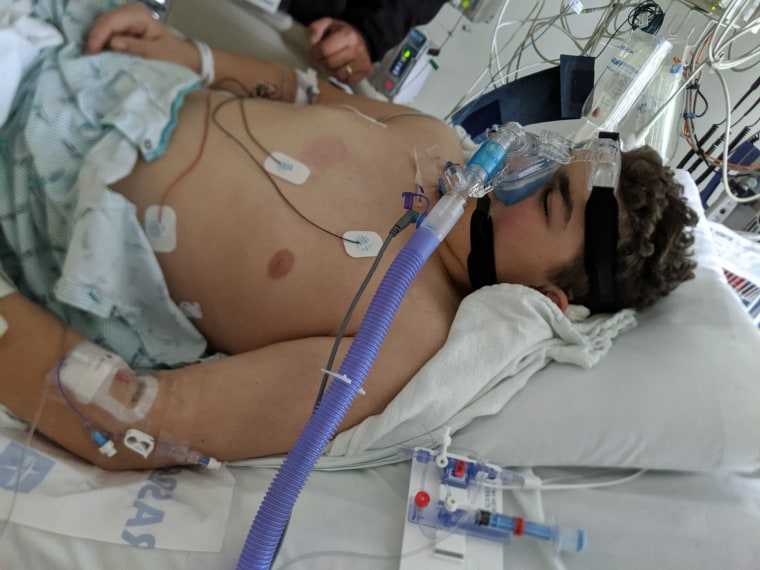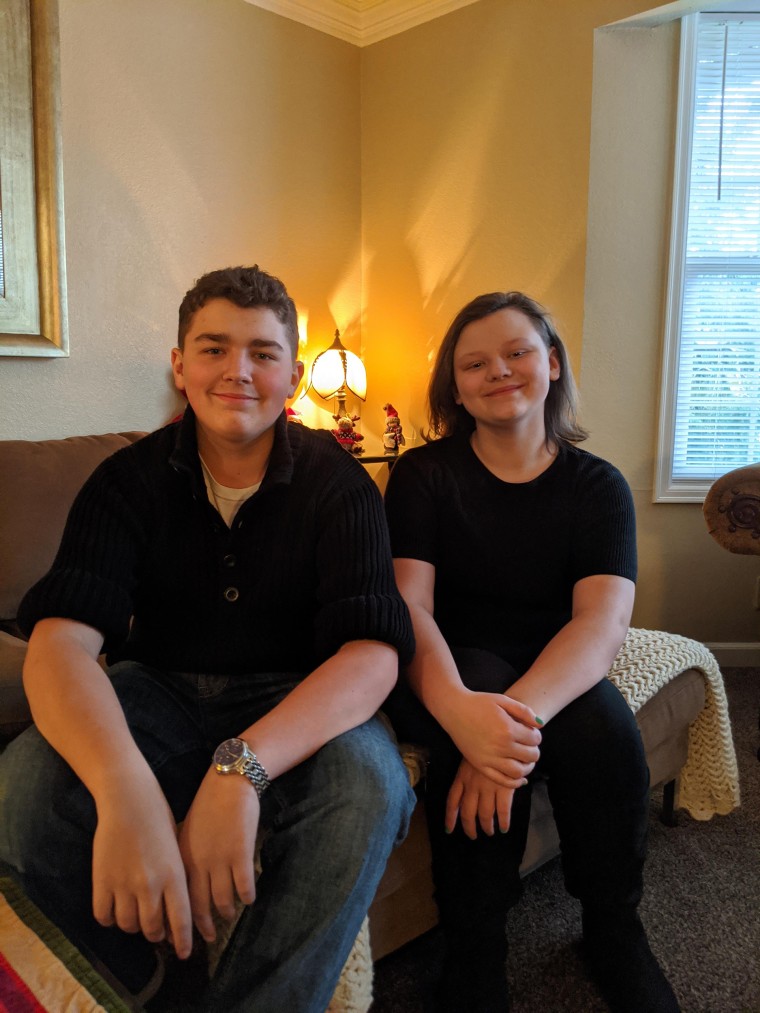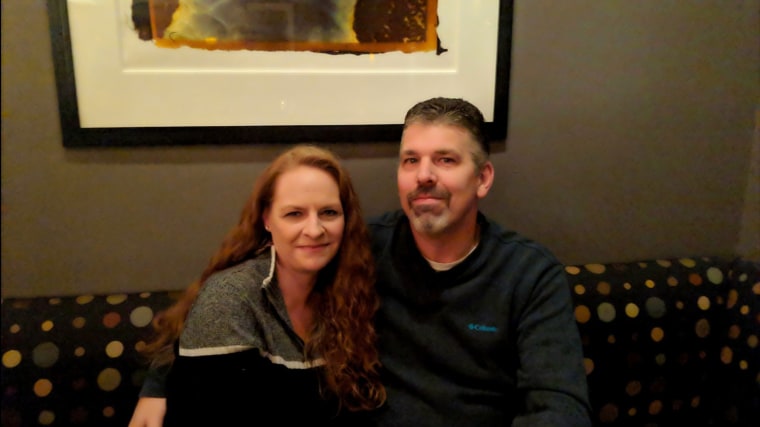The Lawson family of Bothell, Washington, is living through one of the "darkest" experiences they've ever had, Theresa Lawson, a mom of two, told TODAY.
After her 13-year-old son, Anthony, showed a baffling series of symptoms, he was admitted to the ICU of Seattle Children's Hospital. His doctors believe he may have developed the mysterious illness striking kids nationwide who've been infected with the coronavirus, Lawson said.
At NBC News' last count on May 14, more than 110 kids in 19 states had signs of the disease, which the medical community calls pediatric multisystem inflammatory syndrome (PMIS). It presents similarly to Kawasaki disease, which causes swelling in blood vessels throughout the body. The Centers for Disease Control and Prevention are set to issue an alert about PMIS on Thursday.

Download the TODAY app for the latest coverage on the coronavirus outbreak.
PMIS is rare but serious and leads to inflammation in the heart and other organs. It can send the body into organ failure. Persistent fever, rash, abdominal pain, vomiting, diarrhea and red or irritated eyes are common symptoms. It can show up weeks after a child was initially infected, which seems to be the case with Anthony.
Lawson said his symptoms started as a headache and itchy eyes in late April. There was no fever or rash, so Lawson chalked it up to seasonal allergies.
This syndrome can present differently in every child: A 14-year-old in Oregon previously told TODAY her symptoms started as fever, red eyes and searing abdominal pain. A Chicago mom first noticed her 4-year-old daughter's fever, chills and lack of appetite.
Two days after Anthony initially seemed sick, he began vomiting regularly, Lawson recalled, adding that he wasn't eating.
"He hadn’t had the TV on in a couple of days. That’s what really stood out to me," she said.
Three days after his initial symptoms, Anthony went to urgent care. That evening, he developed a smooth rash on his thigh, prompting Lawson to call the facility back. They recommended Benadryl and putting him to bed.
Within a couple of hours, the rash had spread to his chest, shoulders and arms, and turned "deep purple." He was sweaty, vomiting more and by 11 p.m. had a low-grade fever. Lawson noticed his hands and feet were cold and his nails were blue. The whites of his eyes looked like they'd been "painted red," she said.

Lawson decided he needed to go to the hospital when he started struggling to breathe. "He ... was making this wheezing, gargling sound," Lawson described.
When they got Anthony up around 1 a.m., he was so dizzy he almost collapsed. About 30 minutes later, Lawson got a text from her husband, who had taken Anthony to the hospital: "Get dressed now."
Anthony was in cardiac and kidney failure. Doctors there tested him for the coronavirus, but it was negative. An ambulance rushed him to the cardiac ICU of Seattle Children's Hospital.
Lawson recalled telling the doctor upon arriving, "'This has to be some kind of mistake ... A handful of hours ago he was fine ... You're going to be able to fix him, and we'll be able to bring him home, right?' ... (The doctor) goes, 'This is incredibly serious and could be fatal.' I thought I was going to fall over."
"There aren't words to describe" the pain of the next five days, Lawson said. Anthony's temperature stayed at 104 degrees, and his system was shutting down.
During his "24/7" hallucinations, as Lawson described them, Anthony once pulled off his face mask and immediately started crashing. He was too weak to be intubated.
"He was just screaming," Lawson said. "I didn't recognize any part of my child's personality ... He's generally happy, quiet and fairly reserved."
"We were told on multiple occasions he wouldn't survive the next hour," she continued. "I started to come unglued."

On day five, doctors, having heard about the mysterious pediatric illness in New York City, gave Anthony a drug called IVIG, a first-line treatment for Kawasaki disease. Anthony slept for seven and a half hours, and the hallucinations stopped.
When Lawson later learned her son had tested positive for COVID-19 antibodies, the issue then became, "What is this mystery illness? ... How does a healthy kid, an athlete, end up in organ failure?" Lawson said. "It was shocking it could do this amount of damage in a matter of hours."
Now, Anthony is more stable, fever-free and breathing on his own.
He's "doing amazingly well considering what he's been through," Lawson said. "I'm hopeful we've gotten through the worst of it, but we still have days."
Simple tasks exhaust Anthony. He's in physical therapy, and 10-plus doctors still check on him daily. It's unclear whether the illness has caused long-term heart damage, so there's no discharge plan yet, but the Lawsons do know there will be lots of follow-up care.
On Tuesday, Anthony went outside in a wheelchair for the first time since his hospitalization. He told his mom, "It feels really good to be alive," Lawson said.
Throughout her child's illness, Lawson's thought a lot about the parents living in fear of PMIS. She knows that Anthony's first symptom not being a fever may add to their anxiety and confusion.
To them, she advised: "Seek treatment ... if your gut doesn't feel right ... It's far better to leave the hospital, going, 'Wow, we didn't have it,' and ... go to bed that night knowing your baby is safe than play the 'what if' game and waste valuable time."
Lawson also wants the general public to ditch the idea that "this can't happen to you," she said. "If I could've shown on television what went on those first four or five days, there isn't any person who'd walk outside their house without a mask."
This story was updated on May 15, 2020 to include increased case counts of PMIS.